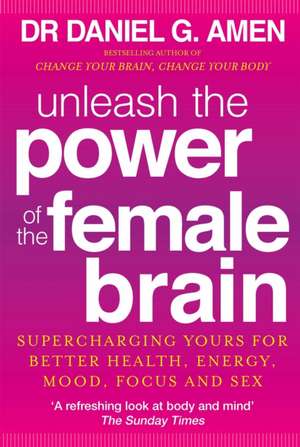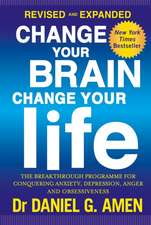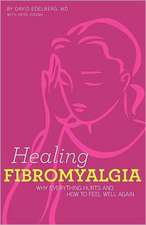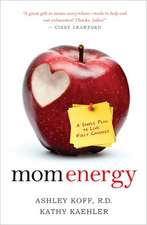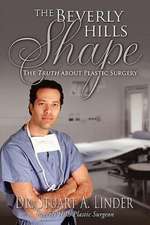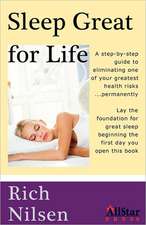Unleash the Power of the Female Brain
Autor Daniel G. Amenen Limba Engleză Paperback – 12 feb 2013
In his first book specifically addressing the female brain, renowned neuropsychiatrist and bestselling author Dr Daniel Amen creates a needed and comprehensive guide to understanding your unique brain and its strengths (intuition, empathy, multi-tasking, collaboration, and a little worry) and vulnerabilities (anxiety, depression and a too busy brain).
By following Dr Amen's advice and putting his twelve simple, one-hour exercises into practice you will discover how to:
- Balance your hormones to optimise brain function
- Feed your brain right to flatten your tummy and boost your reserves with brain-healthy superfoods
- Soothe your busy brain and put an end to anxiety, worry, depression and perfectionism
- Get control of your cravings, no matter where you are in your cycle
- Optimise your brain for great sex, deeper relationships and more pleasure
- Prepare your brain for babies and learn how to raise them in a brain-healthy way
With the tools in this book, you can make positive changes that will not only enhance your life, but those of your family, friends and colleagues. Who doesn't have time for that?
| Toate formatele și edițiile | Preț | Express |
|---|---|---|
| Paperback (2) | 85.59 lei 3-5 săpt. | +46.62 lei 7-13 zile |
| Little Brown Book Group – 12 feb 2013 | 85.59 lei 3-5 săpt. | +46.62 lei 7-13 zile |
| HARMONY – 2 dec 2013 | 98.78 lei 3-5 săpt. |
Preț: 85.59 lei
Preț vechi: 109.88 lei
-22% Nou
Puncte Express: 128
Preț estimativ în valută:
16.38€ • 17.10$ • 13.55£
16.38€ • 17.10$ • 13.55£
Carte disponibilă
Livrare economică 14-28 martie
Livrare express 28 februarie-06 martie pentru 56.61 lei
Preluare comenzi: 021 569.72.76
Specificații
ISBN-13: 9780749959531
ISBN-10: 0749959533
Pagini: 416
Ilustrații: 20 b/w line drawings
Dimensiuni: 151 x 233 x 35 mm
Greutate: 0.54 kg
Editura: Little Brown Book Group
ISBN-10: 0749959533
Pagini: 416
Ilustrații: 20 b/w line drawings
Dimensiuni: 151 x 233 x 35 mm
Greutate: 0.54 kg
Editura: Little Brown Book Group
Descriere
From one of the world's leading experts on how the brain works, a step-by-step, practical program for women to achieve greater health, energy, and lasting happiness by harnessing the power of the female brain.
Recenzii
“Daniel Amen is, by almost any measure, the most popular psychiatrist in America." ߝ Washington Post
"If you want to be stronger, smarter and sexier, this is your book!" - Leeza Gibbons, TV Host, Author, Health Advocate
“Unleash the Power of the Female Brain is a thought-provoking, breakthrough, insightful book which will assist millions of women and their partners to find answers for their personal and intimate lives. Carefully researched Dr. Amen's approach to deep-seated problems will not only effect healing, but will also help to prevent furthering existing pain.” - Christa Dowling, former Editor-in-chief of Vogue and author of The Unkept Promise
“Dr. Amen has spent his career exploring and explaining the vast dimensions of the brain. This book is a must read for all women who want to reduce their stress and create a life of health and happiness.” ߝ Dr. Kathleen Hall, CEO, The Stress Institute & The Mindful Living Network
“I like the idea of giving women the information to improve brain function. And that worrying about our health actually results in a longer, healthier life!” - Cynthia Good; Editor & CEO, Little PINK Book
“An intriguing exploration of the biologic, psychological, social and spiritual interrelationships that can enhance female brain health.” - Nanette K. Wenger, MD, Professor of Medicine (Cardiology) Emeritus Emory University School of Medicine
“We've always thought we were more intuitive and empathetic but to see it in a picture makes it absolute and thrilling.” - Carole Hyatt, founder and CEO of the Leadership Forum
"At last, a user-friendly guidebook to the female brain, for women-- and surprisingly, written by a man. Who else but Dr. Daniel Amen could mix it up as he does? You'll find the latest science, fascinating case histories, and effective action steps to lead us on the road to a healthier brain. Clearly, Dr. Amen appreciates women, loves brains and making them shine-- and can tell us how to be our absolute 'brain-best.' -Hyla Cass MD, author of The Addicted Brain and How to Break Free
From the Hardcover edition.
"If you want to be stronger, smarter and sexier, this is your book!" - Leeza Gibbons, TV Host, Author, Health Advocate
“Unleash the Power of the Female Brain is a thought-provoking, breakthrough, insightful book which will assist millions of women and their partners to find answers for their personal and intimate lives. Carefully researched Dr. Amen's approach to deep-seated problems will not only effect healing, but will also help to prevent furthering existing pain.” - Christa Dowling, former Editor-in-chief of Vogue and author of The Unkept Promise
“Dr. Amen has spent his career exploring and explaining the vast dimensions of the brain. This book is a must read for all women who want to reduce their stress and create a life of health and happiness.” ߝ Dr. Kathleen Hall, CEO, The Stress Institute & The Mindful Living Network
“I like the idea of giving women the information to improve brain function. And that worrying about our health actually results in a longer, healthier life!” - Cynthia Good; Editor & CEO, Little PINK Book
“An intriguing exploration of the biologic, psychological, social and spiritual interrelationships that can enhance female brain health.” - Nanette K. Wenger, MD, Professor of Medicine (Cardiology) Emeritus Emory University School of Medicine
“We've always thought we were more intuitive and empathetic but to see it in a picture makes it absolute and thrilling.” - Carole Hyatt, founder and CEO of the Leadership Forum
"At last, a user-friendly guidebook to the female brain, for women-- and surprisingly, written by a man. Who else but Dr. Daniel Amen could mix it up as he does? You'll find the latest science, fascinating case histories, and effective action steps to lead us on the road to a healthier brain. Clearly, Dr. Amen appreciates women, loves brains and making them shine-- and can tell us how to be our absolute 'brain-best.' -Hyla Cass MD, author of The Addicted Brain and How to Break Free
From the Hardcover edition.
Notă biografică
DANIEL G. AMEN, M.D., is a clinical neuroscientist, psychiatrist, and brain imaging expert who heads the world-renowned Amen Clinics. He has published 26 books including the New York Times bestsellers Use Your Brain to Change Your Age, Change Your Brain, Change Your Life; Magnificent Mind at Any Age; and Change Your Brain, Change Your Body. He is an internationally recognized keynote speaker and the star of several very popular public-television specials. Dr. Amen spearheads the groundbreaking Amen Clinics' retired NFL player brain imaging study and is intimately involved with The Daniel Challenge, a project of Pastor Rick Warren and Saddleback Church to create brain healthy churches.
Extras
1
FALL IN LOVE WITH YOUR FEMALE BRAIN
Care About Your Brain More Than Any Other Body Part
Brain envy is the first step to unleashing the power of the female brain.
My best men are women.
—William Booth, the founder of the Salvation Army (overheard comment)
Susan was a forty-five-year-old mother of four and the CEO of a nonprofit company that created educational materials for learning-disabled children. She loved her husband and her family, and she had a strong sense of mission for her work. She was active in her local church and was a respected member of her community. Viewed from the outside, Susan seemed to “have it all.”
But when Susan came into my office, she told a very different story. “I’m just not feeling good,” she said. “I’m tired all the time, whether I sleep in on the weekends or not! I can’t remember the simplest things, and it seems like I can’t keep my mind on anything for more than a minute before something distracts me. I am feeling very overwhelmed.” She sighed. “And it’s getting worse. Stuff I used to be able to do easily I now really have to struggle through. I know people say they slow down as they get older, but I never thought it would happen to me at this age! I wonder if I have early symptoms of Alzheimer’s disease. I picked up one of your books and you had such a positive message, that even when we get older, we don’t have to feel old. That’s what I want! But all sorts of things in my body seem to be breaking down. I’m gaining weight. My skin is breaking out—that never used to happen! And my cycles feel more jagged and intense. But the worst of it is how crabby and short-tempered I am. My husband keeps telling me I’m always snapping at the children, and at him, and sometimes I don’t even realize it!”
The Strengths and Challenges of the Female Brain
Susan is like so many women I see. She thought she ate a healthy diet but started most days with coffee and a bagel and had a terrible sweet tooth throughout the day. She wanted to work out but could not find the time and consistently drank two glasses of wine at night to relax. There was one major part of her body that she never gave any thought to—her brain. This is ironic, because Susan’s brain governs every aspect of her life. Her brain decides what she eats and how much she sleeps. Her brain decides whether to snap at her children or to take a deep breath and try a different approach. And her brain decides whether Susan is going to live a long and vital life looking and feeling her best or whether she is going to age rapidly, look years older than she is, and perhaps even face a serious disorder like cancer, diabetes, heart disease, or Alzheimer’s.
Of course, none of these decisions as necessarily conscious. But they were made by Susan’s brain nonetheless. And if Susan knew how to take care of her brain, how to give it the biological, psychological, social, and spiritual care it required, then she would be more likely to have a healthy, beautiful brain, which, in turn, would help Susan feel terrific and have the energy she needed to enjoy and be effective in her life.
Brain health is crucial for all my patients: men, women, and children alike. But I have noticed, over many years of practice, that my female patients face special challenges. As we will see in chapter 2, women’s brains have five special strengths: empathy, intuition, self-control, collaboration, and a little worry. Empathy allows women to be loving and nurturing. Intuition enables them to quickly grasp information that may not be obvious or easy to justify through logic. Self-control gives them better control over their impulses. Their collaborative gifts help them to work with others. And their tendency to worry, when it’s in the right proportions, keeps them focused on possible problems and alert to potential solutions.
So far, so good. But like all gifts, these have their dark sides. Empathy can morph into an overwhelming sense of the world riding on your shoulders, the feeling that you have to take care of everyone before your own needs ever get met. Intuition can awaken anxiety-provoking fears as you “know” something is not right without making sure to check it out or get more information. The brain frequently can misperceive things. Self-control can turn into trying to overcontrol others. Being collaborative can all too easily turn into the feeling that you aren’t allowed to do anything until you’ve gotten agreement from everyone else, such as your co-workers, family, or spouse. And the worry that is so useful in small doses can stress you to the point where it hurts your brain and your body and won’t allow you to rest.
Susan too struggled with both the strengths and the challenges of the female brain. Like many women, she felt guilty no matter what she did. If she was home, she was thinking about work; if she was at work, she was thinking about home. A deeply empathetic and caring person, Susan took on everybody’s problems as if they were her own. She worried about her personal assistant, who was caring for an elderly mother; her husband, who had come back from the doctor with news of his high blood sugar; and her children, one of whom had just started to date. Susan worried about the learning-disabled students for whom her company produced educational materials. And she worried about her own parents; her mother seemed more forgetful and her father less engaged. Wherever she looked, Susan felt as though there was another demand she should be meeting, another problem she should be solving, another person to whom she could be giving just a little bit more. She just felt as though whatever she did, she could never win. So of course when her husband approached her for sex or even for an affectionate night of cuddling in front of the TV, Susan couldn’t stay in the moment and enjoy their time together. She just couldn’t turn off her busy brain.
“Susan,” I said to her after hearing about her concerns, “it sounds like you are taking care of everyone in your life. But it is time to start taking much better care of yourself. Everyone you care about will be better if you are at your best.”
Susan looked at me and asked, “How do I start?”
Why Your Brain Matters!
Your Brain Is Involved in Everything You Do
It makes the healthy choices or the unhealthy choices that make you feel good or bad.
When Your Brain Works Right, You Work Right
Your reactions and decisions benefit you.
When Your Brain Is Troubled, You Have Trouble in Your Life
Your bad choices complicate everything.
You Can Change Your Brain and Enhance Your Life!
Following brain-healthy guidelines can give you a fresh start.
The Four Circles Approach to Your Female Brain
At the Amen Clinics, we have developed our Four Circles Approach, which is a “brain smart” comprehensive approach to evaluating and treating our patients. You are always more than your symptoms, and to be well it is critical to take into account all aspects of your biology, psychology, social connections, and spiritual health. Our success rates with patients are very high because we take an integrated approach to understanding and healing the brain. If any one of these areas is not optimized, your brain will suffer, and so will your health, well-being, appearance, mood, and relationships.
With Susan, I went to the whiteboard in my office and drew four big circles. In the first circle I wrote Biology and began with a set of questions to look at the biological factors influencing her brain. I discovered that no one in her extended family had a history of Alzheimer’s disease or other dementia-like processes, but there was a family history of depression. Susan wasn’t on any medications. Her diet was not great, which, as we’ll see in chapter 5, is a terrible thing to do to your brain. She also tended to eat a lot on the run, because she was so busy—also not good for the brain.
Another big biological problem in Susan’s profile was the five or fewer hours of sleep she got each night. I understood her dilemma. With four children and a high-powered job, it was hard to get everything done in a day. But not getting enough sleep is one of the worst things you can do for your brain, so this was a big concern.
As you’ll learn in chapter 4, hormones play a huge role in your brain’s health, and Susan’s hormones were not in the best shape. Her lab results showed that her thyroid levels were low, as were the hormones produced by her adrenal glands (cortisol and DHEA, or dehydroepiandrosterone), likely from chronic stress. Susan basically relied on coffee to get herself going during the day. Then she had a couple of glasses of wine each night to help her relax, which didn’t help her hormones, blood sugar, weight, sleep, or brain. Restoring and balancing Susan’s hormones was going to be a key aspect of improving her brain’s biological health. I was eager to look at her brain scans (I’ll tell you more about this soon) to see what was going on.
First, though, I wanted to see what was happening in the other three circles. In the second circle I wrote the word Psychology. Psychologically, Susan was thinking in undisciplined and negative ways; her busy brain kept returning to the same worries, anxieties, and self-criticisms: I should have done that differently. She probably doesn’t like me. I’m not doing enough for him. What is wrong with me, anyway? Like many female brains, Susan’s was prone to a kind of perfectionism in which she magnified her flaws and minimized her good points. In Susan’s mind, the few extra pounds she had put on felt like the ultimate proof that she was old and ugly. Her children’s normal childhood crises were clear evidence of Susan’s not being a good enough mother. And her husband’s frustration with Susan’s short temper seemed like a sign (completely incorrectly, as it turned out) that their marriage was in trouble.
These psychological issues were both the result of Susan’s poor brain health and a contributing factor to it. Thinking in undisciplined, negative ways is just not good for the health of your brain, which is why, in chapter 6, I teach you how not to believe every stupid thought you have. I refer to these “automatic negative thoughts” as ANTs, and I’ll show you several simple, effective ways of ridding yourself of them.
In the third circle I wrote Social Connections. There too Susan’s brain was facing a number of challenges. Susan felt separated from the most important people in her life, distant from her husband and irritable with her kids. At work, she felt overwhelmed. The support she might have gotten from friends or from her community at church seemed out of reach, because Susan felt too exhausted to reach out.
In the last circle I wrote Spiritual Health. As it happened, Susan’s brain was in good shape in this circle. She had a deep sense of meaning and purpose in her life that sustained her, even in this challenging time. She felt her work mattered to others, and she knew that her presence at home was crucial for her husband and children. She had a deep sense of connection to God, the planet, and the future. Susan’s brain definitely benefited from her sense of meaning and purpose.
Having evaluated each of Susan’s four circles, I moved on to look at Susan’s brain SPECT scans. One of the unique aspects of our work that differentiates us from most psychiatrists is our belief that we should actually look at and evaluate the organ we treat. We do a brain imaging study called SPECT (single photon emission computed tomography) that evaluates brain blood flow and activity patterns. It looks at how the brain works. At the Amen Clinics we have been performing SPECT scans for twenty-two years and have a database of over 78,000 scans, giving us a significant edge on how to use them. SPECT scans basically show us three things: areas of the brain that work well and display good activity, areas of the brain that are low in activity, and areas of the brain that are high in activity.
Susan’s SPECT scans helped me get an even clearer picture of what was going on with her. I could see that she had low activity in her temporal lobes, the memory areas of her brain, which explained her forgetfulness. She also had low activity in an area of her prefrontal cortex (PFC)—the “executive control” center in the front third of her brain, associated with focus, concentration, and impulse control. The low activity in her temporal lobes and PFC are common in low thyroid states. I suspected that these problems would improve significantly as soon as Susan started taking better care of her brain: balancing her hormones, getting the food, supplements, sleep, exercise, and psychological help she needed, as well as getting more social support from her loved ones and her community.
Susan was also experiencing problems in her limbic system, her “emotional brain.” There was increased activity there, probably from the chronic stress that she felt at work, at home, and every place else. Driving out the ANTs would help calm this part of Susan’s brain, as would meditation, self-hypnosis, and other relaxation techniques. Healthy food, sleep, a multiple vitamin, fish oil, optimizing her vitamin D level, other targeted supplements, and exercise would help too.
I showed Susan her scan and a healthy one for comparison and pointed out each one of the areas that could use help. As soon as Susan saw her scan and understood what it meant, she asked if it could be made better. This is a question I love answering. The last twenty-two years of my life have been focused on changing my patients’ brains and changing their lives. “Yes,” I said. “If you follow the program I give you, your brain can become much healthier and you will feel much better.” That got her excited.
“You’re telling me if I do a better job of taking care of my brain, that this isn’t permanent, right?” she said to me. “If I do the right things, I could have a better brain.”
“That’s right,” I assured her. “You have to start thinking and caring about your brain.”
“Starting now,” she said, “I want a better brain and a better life.” Her face broke out into a smile. “This is just the best news I’ve heard in a long time,” she added. “What do I do? Let’s get started.”
Susan had just developed brain envy.
FALL IN LOVE WITH YOUR FEMALE BRAIN
Care About Your Brain More Than Any Other Body Part
Brain envy is the first step to unleashing the power of the female brain.
My best men are women.
—William Booth, the founder of the Salvation Army (overheard comment)
Susan was a forty-five-year-old mother of four and the CEO of a nonprofit company that created educational materials for learning-disabled children. She loved her husband and her family, and she had a strong sense of mission for her work. She was active in her local church and was a respected member of her community. Viewed from the outside, Susan seemed to “have it all.”
But when Susan came into my office, she told a very different story. “I’m just not feeling good,” she said. “I’m tired all the time, whether I sleep in on the weekends or not! I can’t remember the simplest things, and it seems like I can’t keep my mind on anything for more than a minute before something distracts me. I am feeling very overwhelmed.” She sighed. “And it’s getting worse. Stuff I used to be able to do easily I now really have to struggle through. I know people say they slow down as they get older, but I never thought it would happen to me at this age! I wonder if I have early symptoms of Alzheimer’s disease. I picked up one of your books and you had such a positive message, that even when we get older, we don’t have to feel old. That’s what I want! But all sorts of things in my body seem to be breaking down. I’m gaining weight. My skin is breaking out—that never used to happen! And my cycles feel more jagged and intense. But the worst of it is how crabby and short-tempered I am. My husband keeps telling me I’m always snapping at the children, and at him, and sometimes I don’t even realize it!”
The Strengths and Challenges of the Female Brain
Susan is like so many women I see. She thought she ate a healthy diet but started most days with coffee and a bagel and had a terrible sweet tooth throughout the day. She wanted to work out but could not find the time and consistently drank two glasses of wine at night to relax. There was one major part of her body that she never gave any thought to—her brain. This is ironic, because Susan’s brain governs every aspect of her life. Her brain decides what she eats and how much she sleeps. Her brain decides whether to snap at her children or to take a deep breath and try a different approach. And her brain decides whether Susan is going to live a long and vital life looking and feeling her best or whether she is going to age rapidly, look years older than she is, and perhaps even face a serious disorder like cancer, diabetes, heart disease, or Alzheimer’s.
Of course, none of these decisions as necessarily conscious. But they were made by Susan’s brain nonetheless. And if Susan knew how to take care of her brain, how to give it the biological, psychological, social, and spiritual care it required, then she would be more likely to have a healthy, beautiful brain, which, in turn, would help Susan feel terrific and have the energy she needed to enjoy and be effective in her life.
Brain health is crucial for all my patients: men, women, and children alike. But I have noticed, over many years of practice, that my female patients face special challenges. As we will see in chapter 2, women’s brains have five special strengths: empathy, intuition, self-control, collaboration, and a little worry. Empathy allows women to be loving and nurturing. Intuition enables them to quickly grasp information that may not be obvious or easy to justify through logic. Self-control gives them better control over their impulses. Their collaborative gifts help them to work with others. And their tendency to worry, when it’s in the right proportions, keeps them focused on possible problems and alert to potential solutions.
So far, so good. But like all gifts, these have their dark sides. Empathy can morph into an overwhelming sense of the world riding on your shoulders, the feeling that you have to take care of everyone before your own needs ever get met. Intuition can awaken anxiety-provoking fears as you “know” something is not right without making sure to check it out or get more information. The brain frequently can misperceive things. Self-control can turn into trying to overcontrol others. Being collaborative can all too easily turn into the feeling that you aren’t allowed to do anything until you’ve gotten agreement from everyone else, such as your co-workers, family, or spouse. And the worry that is so useful in small doses can stress you to the point where it hurts your brain and your body and won’t allow you to rest.
Susan too struggled with both the strengths and the challenges of the female brain. Like many women, she felt guilty no matter what she did. If she was home, she was thinking about work; if she was at work, she was thinking about home. A deeply empathetic and caring person, Susan took on everybody’s problems as if they were her own. She worried about her personal assistant, who was caring for an elderly mother; her husband, who had come back from the doctor with news of his high blood sugar; and her children, one of whom had just started to date. Susan worried about the learning-disabled students for whom her company produced educational materials. And she worried about her own parents; her mother seemed more forgetful and her father less engaged. Wherever she looked, Susan felt as though there was another demand she should be meeting, another problem she should be solving, another person to whom she could be giving just a little bit more. She just felt as though whatever she did, she could never win. So of course when her husband approached her for sex or even for an affectionate night of cuddling in front of the TV, Susan couldn’t stay in the moment and enjoy their time together. She just couldn’t turn off her busy brain.
“Susan,” I said to her after hearing about her concerns, “it sounds like you are taking care of everyone in your life. But it is time to start taking much better care of yourself. Everyone you care about will be better if you are at your best.”
Susan looked at me and asked, “How do I start?”
Why Your Brain Matters!
Your Brain Is Involved in Everything You Do
It makes the healthy choices or the unhealthy choices that make you feel good or bad.
When Your Brain Works Right, You Work Right
Your reactions and decisions benefit you.
When Your Brain Is Troubled, You Have Trouble in Your Life
Your bad choices complicate everything.
You Can Change Your Brain and Enhance Your Life!
Following brain-healthy guidelines can give you a fresh start.
The Four Circles Approach to Your Female Brain
At the Amen Clinics, we have developed our Four Circles Approach, which is a “brain smart” comprehensive approach to evaluating and treating our patients. You are always more than your symptoms, and to be well it is critical to take into account all aspects of your biology, psychology, social connections, and spiritual health. Our success rates with patients are very high because we take an integrated approach to understanding and healing the brain. If any one of these areas is not optimized, your brain will suffer, and so will your health, well-being, appearance, mood, and relationships.
With Susan, I went to the whiteboard in my office and drew four big circles. In the first circle I wrote Biology and began with a set of questions to look at the biological factors influencing her brain. I discovered that no one in her extended family had a history of Alzheimer’s disease or other dementia-like processes, but there was a family history of depression. Susan wasn’t on any medications. Her diet was not great, which, as we’ll see in chapter 5, is a terrible thing to do to your brain. She also tended to eat a lot on the run, because she was so busy—also not good for the brain.
Another big biological problem in Susan’s profile was the five or fewer hours of sleep she got each night. I understood her dilemma. With four children and a high-powered job, it was hard to get everything done in a day. But not getting enough sleep is one of the worst things you can do for your brain, so this was a big concern.
As you’ll learn in chapter 4, hormones play a huge role in your brain’s health, and Susan’s hormones were not in the best shape. Her lab results showed that her thyroid levels were low, as were the hormones produced by her adrenal glands (cortisol and DHEA, or dehydroepiandrosterone), likely from chronic stress. Susan basically relied on coffee to get herself going during the day. Then she had a couple of glasses of wine each night to help her relax, which didn’t help her hormones, blood sugar, weight, sleep, or brain. Restoring and balancing Susan’s hormones was going to be a key aspect of improving her brain’s biological health. I was eager to look at her brain scans (I’ll tell you more about this soon) to see what was going on.
First, though, I wanted to see what was happening in the other three circles. In the second circle I wrote the word Psychology. Psychologically, Susan was thinking in undisciplined and negative ways; her busy brain kept returning to the same worries, anxieties, and self-criticisms: I should have done that differently. She probably doesn’t like me. I’m not doing enough for him. What is wrong with me, anyway? Like many female brains, Susan’s was prone to a kind of perfectionism in which she magnified her flaws and minimized her good points. In Susan’s mind, the few extra pounds she had put on felt like the ultimate proof that she was old and ugly. Her children’s normal childhood crises were clear evidence of Susan’s not being a good enough mother. And her husband’s frustration with Susan’s short temper seemed like a sign (completely incorrectly, as it turned out) that their marriage was in trouble.
These psychological issues were both the result of Susan’s poor brain health and a contributing factor to it. Thinking in undisciplined, negative ways is just not good for the health of your brain, which is why, in chapter 6, I teach you how not to believe every stupid thought you have. I refer to these “automatic negative thoughts” as ANTs, and I’ll show you several simple, effective ways of ridding yourself of them.
In the third circle I wrote Social Connections. There too Susan’s brain was facing a number of challenges. Susan felt separated from the most important people in her life, distant from her husband and irritable with her kids. At work, she felt overwhelmed. The support she might have gotten from friends or from her community at church seemed out of reach, because Susan felt too exhausted to reach out.
In the last circle I wrote Spiritual Health. As it happened, Susan’s brain was in good shape in this circle. She had a deep sense of meaning and purpose in her life that sustained her, even in this challenging time. She felt her work mattered to others, and she knew that her presence at home was crucial for her husband and children. She had a deep sense of connection to God, the planet, and the future. Susan’s brain definitely benefited from her sense of meaning and purpose.
Having evaluated each of Susan’s four circles, I moved on to look at Susan’s brain SPECT scans. One of the unique aspects of our work that differentiates us from most psychiatrists is our belief that we should actually look at and evaluate the organ we treat. We do a brain imaging study called SPECT (single photon emission computed tomography) that evaluates brain blood flow and activity patterns. It looks at how the brain works. At the Amen Clinics we have been performing SPECT scans for twenty-two years and have a database of over 78,000 scans, giving us a significant edge on how to use them. SPECT scans basically show us three things: areas of the brain that work well and display good activity, areas of the brain that are low in activity, and areas of the brain that are high in activity.
Susan’s SPECT scans helped me get an even clearer picture of what was going on with her. I could see that she had low activity in her temporal lobes, the memory areas of her brain, which explained her forgetfulness. She also had low activity in an area of her prefrontal cortex (PFC)—the “executive control” center in the front third of her brain, associated with focus, concentration, and impulse control. The low activity in her temporal lobes and PFC are common in low thyroid states. I suspected that these problems would improve significantly as soon as Susan started taking better care of her brain: balancing her hormones, getting the food, supplements, sleep, exercise, and psychological help she needed, as well as getting more social support from her loved ones and her community.
Susan was also experiencing problems in her limbic system, her “emotional brain.” There was increased activity there, probably from the chronic stress that she felt at work, at home, and every place else. Driving out the ANTs would help calm this part of Susan’s brain, as would meditation, self-hypnosis, and other relaxation techniques. Healthy food, sleep, a multiple vitamin, fish oil, optimizing her vitamin D level, other targeted supplements, and exercise would help too.
I showed Susan her scan and a healthy one for comparison and pointed out each one of the areas that could use help. As soon as Susan saw her scan and understood what it meant, she asked if it could be made better. This is a question I love answering. The last twenty-two years of my life have been focused on changing my patients’ brains and changing their lives. “Yes,” I said. “If you follow the program I give you, your brain can become much healthier and you will feel much better.” That got her excited.
“You’re telling me if I do a better job of taking care of my brain, that this isn’t permanent, right?” she said to me. “If I do the right things, I could have a better brain.”
“That’s right,” I assured her. “You have to start thinking and caring about your brain.”
“Starting now,” she said, “I want a better brain and a better life.” Her face broke out into a smile. “This is just the best news I’ve heard in a long time,” she added. “What do I do? Let’s get started.”
Susan had just developed brain envy.
